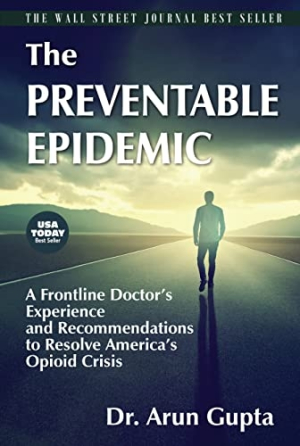The Preventable Epidemic
A Frontline Doctor's Experience and Recommendations to Resolve America's Opioid Crisis
The Preventable Epidemic is a timely survey of widespread opioid use disorder in the US with persuasive recommendations for improving treatment options.
In his health book The Preventable Epidemic, Arun Gupta explains how the US’s opioid epidemic came to be and shares recommendations for fixing it.
As an addiction doctor in rural Michigan, Gupta has seen firsthand the causes and effects of the US’s opioid crisis. He attributes opioid addiction to a variety of factors, including dishonest marketing from pharmaceutical companies, onerous regulations that make doctors unwilling or unable to specialize in addiction, and unreliable access to health care. From Gupta’s perspective, medication-assisted treatment (MAT) is the best possible option for reducing opioid-related deaths, but the millions who need this lifesaving care face too many barriers to getting it.
In accessible, passionate prose, Gupta reviews the history of opioid use, treatment, and regulation in the United States, as well as his own efforts at curbing addiction rates in his community. He builds his arguments based on personal experience, scholarly texts, and anecdotal evidence. Together, these elements paint a grim picture of how many Americans are struggling with opioid use disorder (OUD), how hard it is for them to find the help they need, and the dire consequences of this lack of access. Indeed, Gupta asserts that the fight for an end to the opioid crisis is mental as well as physical, requiring people to move away from myths and stigmas.
After covering the opioid epidemic’s disparate causes and widespread implications in thorough terms, the book proposes a focused solution that eschews the methods of the inefficient “war on drugs.” It declares that demand for opioids can be decreased through the general provision of affordable, accessible, and well-rounded care to all. The rousing concluding section outlines clear steps for achieving this outcome—steps requiring the involvement of government officials, doctors, and individual citizens alike. A letter template that can be used to urge congressional representatives to provide tangible support to both OUD sufferers and their families is among its useful tools. However, the book’s persuasiveness is undermined somewhat by apparent contradictions, as when it says that OxyContin is “stronger” than morphine on one page but then asserts that it is “less potent” than morphine on the next.
The Preventable Epidemic is a timely survey of widespread opioid use disorder in the US with recommendations for improving treatment options.
Reviewed by
Eileen Gonzalez
Disclosure: This article is not an endorsement, but a review. The publisher of this book provided free copies of the book and paid a small fee to have their book reviewed by a professional reviewer. Foreword Reviews and Clarion Reviews make no guarantee that the publisher will receive a positive review. Foreword Magazine, Inc. is disclosing this in accordance with the Federal Trade Commission’s 16 CFR, Part 255.


